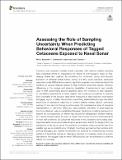Files in this item
Assessing the role of sampling uncertainty when predicting behavioral responses of tagged cetaceans exposed to naval sonar
Item metadata
| dc.contributor.author | Bouchet, Phil | |
| dc.contributor.author | Harris, Catriona M | |
| dc.contributor.author | Thomas, Len | |
| dc.date.accessioned | 2021-10-04T08:30:08Z | |
| dc.date.available | 2021-10-04T08:30:08Z | |
| dc.date.issued | 2021-10-04 | |
| dc.identifier | 273096372 | |
| dc.identifier | a864896a-6a37-42c2-b2fb-8f65e3916014 | |
| dc.identifier | 85117210855 | |
| dc.identifier | 000717179300001 | |
| dc.identifier.citation | Bouchet , P , Harris , C M & Thomas , L 2021 , ' Assessing the role of sampling uncertainty when predicting behavioral responses of tagged cetaceans exposed to naval sonar ' , Frontiers in Marine Science , vol. 8 , 674554 . https://doi.org/10.3389/fmars.2021.674554 | en |
| dc.identifier.issn | 2296-7745 | |
| dc.identifier.other | ORCID: /0000-0002-7436-067X/work/101217842 | |
| dc.identifier.other | ORCID: /0000-0001-9198-2414/work/101217924 | |
| dc.identifier.other | ORCID: /0000-0002-2144-2049/work/101218133 | |
| dc.identifier.uri | https://hdl.handle.net/10023/24076 | |
| dc.description | Funding: This work was financially supported by the US Navy Living Marine Resources Program (LMR) Contract No. N3943018C2080. Support for the Atlantic BRS project was provided by the Naval Facilities Engineering Command Atlantic under Contract No. N62470-15-D-8006, Task Order 18F4036, Issued to HDR, Inc. | en |
| dc.description.abstract | Concerns over cetacean mortality events coincident with maritime warfare exercises have motivated efforts to characterise the effects of anthropogenic noise on free-ranging whales and dolphins. By monitoring the movement, diving, and acoustic behaviours of individual whales before, during, and after sound exposure, behavioural response studies (BRSs) have supported significant progress in our understanding of the sensitivity of various cetacean species to high-powered naval sonar signals. However, differences in the designs and sampling capabilities of animal-borne tags typically used in BRS experiments prompt questions about the influence of data resolution in quantitative assessments of noise impacts. We conducted simulations to examine how uncertainty in the acoustic dose either measured on high-resolution multi-sensor biologging tags or modelled from position-transmitting satellite telemetry tags may affect predictions of behavioural responses in Cuvier’s beaked whales (Ziphius cavirostris) exposed to low- and mid-frequency active sonar. We considered an array of scenarios representative of real-world BRSs and used posterior estimates of dose-response functions obtained under an established Bayesian hierarchical modelling framework to explore the consequences of different tag choices for management decision-making. Our results indicate that (1) the zone of impact from a sonar source is under-estimated in most test conditions, (2) substantial reductions in the uncertainty surrounding dose-response relationships are possible at higher sample sizes, and (3) this largely holds true irrespective of tag choice under the scenarios considered, unless positional fixes from satellite tags are consistently poor. Strategic monitoring approaches that combine both archival biologging and satellite biotelemetry are essential for characterising complex patterns of behavioural change in cetaceans exposed to increasing levels of acoustic disturbance. We suggest ways in which BRS protocols can be optimised to curtail the effects of uncertainty. | |
| dc.format.extent | 16 | |
| dc.format.extent | 4516885 | |
| dc.language.iso | eng | |
| dc.relation.ispartof | Frontiers in Marine Science | en |
| dc.subject | Acoustics | en |
| dc.subject | Dose-response | en |
| dc.subject | Underwater noise | en |
| dc.subject | Military sonar | en |
| dc.subject | Beaked whales | en |
| dc.subject | Bayesian modelling | en |
| dc.subject | GC Oceanography | en |
| dc.subject | QA Mathematics | en |
| dc.subject | QH301 Biology | en |
| dc.subject | DAS | en |
| dc.subject.lcc | GC | en |
| dc.subject.lcc | QA | en |
| dc.subject.lcc | QH301 | en |
| dc.title | Assessing the role of sampling uncertainty when predicting behavioral responses of tagged cetaceans exposed to naval sonar | en |
| dc.type | Journal article | en |
| dc.contributor.institution | University of St Andrews. School of Mathematics and Statistics | en |
| dc.contributor.institution | University of St Andrews. School of Biology | en |
| dc.contributor.institution | University of St Andrews. Scottish Oceans Institute | en |
| dc.contributor.institution | University of St Andrews. Centre for Research into Ecological & Environmental Modelling | en |
| dc.contributor.institution | University of St Andrews. Sea Mammal Research Unit | en |
| dc.contributor.institution | University of St Andrews. Office of the Principal | en |
| dc.contributor.institution | University of St Andrews. Statistics | en |
| dc.contributor.institution | University of St Andrews. Marine Alliance for Science & Technology Scotland | en |
| dc.identifier.doi | https://doi.org/10.3389/fmars.2021.674554 | |
| dc.description.status | Peer reviewed | en |
This item appears in the following Collection(s)
Items in the St Andrews Research Repository are protected by copyright, with all rights reserved, unless otherwise indicated.

